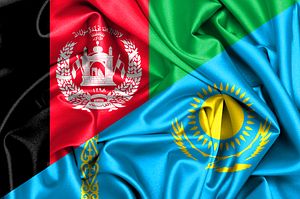Economics and security headlined during Afghan President Ashraf Ghani’s two-day visit to Kazakhstan over the weekend, underscoring mutual concerns and painful realities in both Astana and Kabul. Ghani also made what has rapidly become a standard stop by high-level visitors to Astana: delivering a speech at Nazarbayev University. The trip was Ghani’s first official visit to Kazakhstan.
Among the deals settled between the two countries was a contract for 600,000 tons of Kazakh wheat. According to TOLOnews, an Afghan news site, Ghani commented that “Kazakhstan is one of the biggest wheat producers in the region and we need imported wheat in next five years.” He also noted that Kazakhstan is a steel producer and Afghanistan’s infrastructure development plans necessitate a solid supply.
Kazakhstan may not be party to some of the grander-scale regional integration schemes, like the TAPI pipeline or the CASA-1000 project, but it stands as the region’s most successful economy. The boom times seem to be over however, with low oil and gas prices cutting into Astana’s pockets. While marketing wheat and steel to Afghanistan isn’t going to make up the missing revenue, it does further Astana’s goals to act as a regional power and a global player.
According to the Trend, since 2002, Kazakhstan has delivered $20 million in foodstuffs to Afghanistan and has allocated $50 million for Afghan students to study at Kazakh universities. Trend also notes that trade between the two countries amounted to $336.7 million in 2014, up from $251.4 million in 2013. The Astana Times stated that trade now stands at $400 million.
Part of Ghani’s push for deeper engagement with Kazakhstan might be his country’s stalled detente with Pakistan. TOLOnews commented that “Afghan officials and traders consider Kazakhstan and Uzbekistan as better alternative for import of foodstuff and reconstruction materials instead of Pakistan.”
Security featured heavily in comments during the visit. According to RFE/RL, during his speech at Nazarbayev University Ghani categorized “extremism, alienation and embrace of violence” as regional problems. He reportedly “told students that people from many different countries — including China, Russia, Saudi Arabia, Pakistan, Uzbekistan, and Kazakhstan — had been involved in Islamic extremist violence in Afghanistan.”
In its coverage of remarks made by Ghani to Kazakh journalists ahead of the visit, the Astana Times made no mention of Kazakhstan as a potential source of extremists–though they do mention Uzbekistan, Russia, Chechnya, Tajikistan and China. “These people are not citizens of our country and have no problems with Afghanistan,” Ghani reportedly commented. “They have problems in their countries. So, the problem can be solved only through development of a comprehensive regional plan.”
As Tamim Asey wrote in The Diplomat this past summer, in modern history, relations between Afghanistan and its neighbors to the north mostly revolve around security. Central Asian government policies aimed at crushing the rise of extremism might have the opposite effect in breeding resentment between people and their governments, which impacts Afghanistan where many fighters from Central Asia end up. Spillover is Central Asia’s perpetual buzzword in relation to Afghanistan, but the spillover, in a way, went in reverse. For example, the Islamic Movement of Uzbekistan (IMU) originated in the the country for which it is named, but was pushed out and into Afghanistan and Pakistan where it has been for more than a decade, fighting alongside the Taliban against the Afghan government.

































